When talking about online security, the word VPN always comes to mind. Many people know that a Virtual Private Network is used for protecting your online privacy and establishing a secure connection.
However, this tool is useful for many other purposes, so much so, that it’s hard to give you a VPN definition in one or two sentences. Thus, I will explain to you what a VPN is, talk about the meaning of it and help you understand what a VPN does.
What Is a VPN: Definition
Let’s start with the basics. To give you a VPN definition, I first must explain what it is and how it works. Namely, a VPN stands for Virtual Private Network and it’s a tool that allows you to change your IP address and encrypt your connection.
By its definition, we can realize that a VPN actually lets you establish a connection to a remote virtual network or server. This means that you route your traffic through that VPN server that encrypts your connection and hides it from the prying eyes of your ISP.
The VPN does so by establishing a virtual tunnel between you and the internet. To better explain the definition of a VPN, you can check the image below:
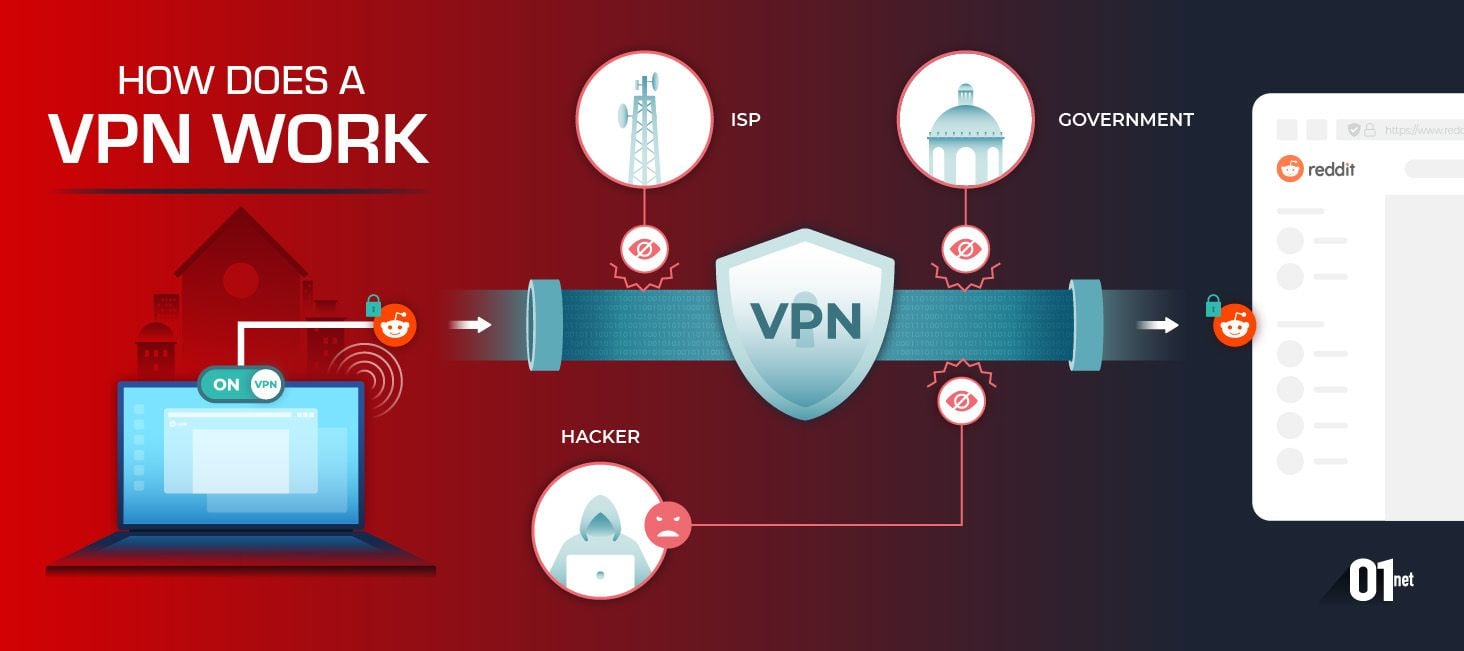
Once you establish a connection to a server, every bit of internet traffic goes through that virtual tunnel and is fully protected thanks to encryption.
Unlike other users online, your internet traffic cannot be seen by your ISP, hackers, or the authorities, which lets you browse the web anonymously.
What Does a VPN Do – Explanations
Now that you know what a VPN is and its complete definition, we need to see what this service can do for you. The definition we gave you is pretty straightforward and that’s pretty much everything to know about how a VPN works.
However, once you connect to a Virtual Private Network, you can enjoy countless benefits, which is why using this service is so popular in recent years. Wondering how a VPN works and what it can do for you?
Well, here are the benefits you can gain from it:
Online Security & Privacy
Obviously, a VPN is going to provide you with the rock-solid security you need for navigating the corners of the internet effortlessly. If you’re still wondering what a VPN is, know that this is its main benefit – or should be.
As said in the VPN definition, this service establishes a virtual tunnel that protects your connection thanks to encryption and changes your IP address. Speaking of which, a VPN gives you military-grade encryption, which is the highest level, protecting your traffic without any compromises.
Therefore, you can make your traffic invisible to your ISP, hackers, or the authorities that would otherwise easily be able to intercept it. VPNs offer advanced security features as well, which further bolster your online privacy.
The most important one is a kill switch. This feature prevents your IP address from leaking into the public by shutting down your internet connection in case your VPN connection is lost.
What does a VPN do when it comes to your traffic? Well, some of the best providers that we’re going to talk about offer so-called no-logs policies. This means that they store no logs of your browsing history, IP address, and other information, so even they don’t know what you’re doing online.
All of this makes a Virtual Private Network absolutely THE best solution to browse the web in safety and complete anonymity.
Safe & Secure Torrenting
Torrenting is frowned upon in many countries around the world. Without a VPN, your browsing activities are exposed to your ISP, which can, in that case, easily pick up when you’re downloading torrents.
Once that happens, it will take note of your IP address, which file you downloaded, and the time of the download. If we’re talking about a copyrighted file, your ISP will most likely contact the copyright holder, give out this information to him, and you’ll be in big trouble.
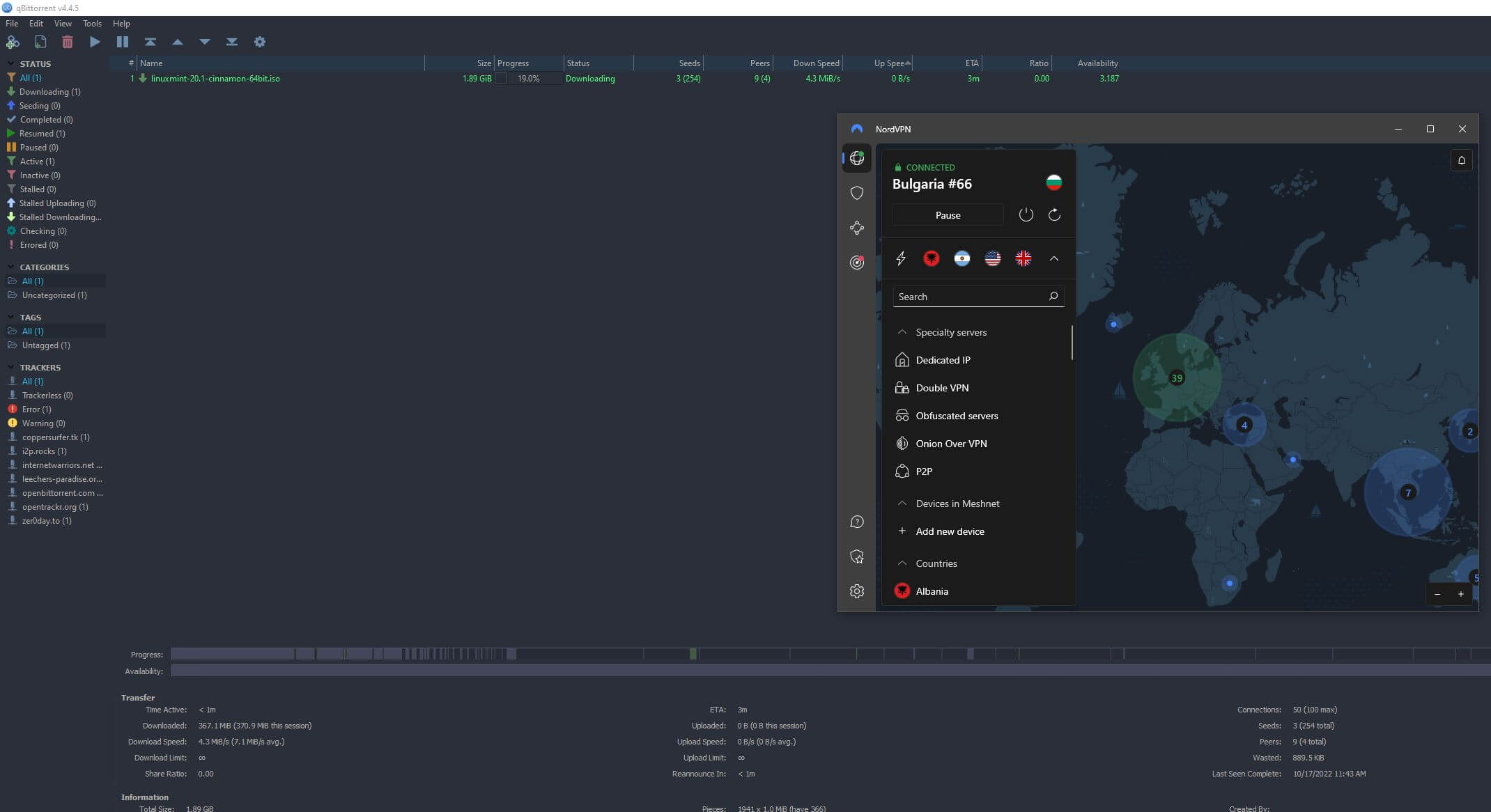
Not only will you be sued, but as a result, you can be forced to pay a huge fine or spend some time in jail. What is a VPN going to do in this scenario? Well, encrypting your connection the way we explained, it will hide the fact that you’re downloading torrents from your ISP.
Hence, you’ll be able to enjoy anonymous torrenting and download any files you want without any repercussions. You will basically appear as someone else in another country, which makes it impossible for anyone to trace any activity back to you.
Unblocking Geo-Restricted (Streaming) Sites
Those thinking about what does a VPN do except the things we mentioned, will be happy to hear about geo-restrictions and shattering them with this tool. A Virtual Private Network will let you hide your original IP and replace it with an IP from a VPN server in another country.
As a result, it will make you look like you’re really located in that particular country, rather than your original location.
This is crucial for unblocking geo-restricted websites that are available only in certain regions. Most likely, you’re going to be interested in watching Netflix US, Japan, Canada, UK, or any other catalog you find interesting.
Logically, to access Netflix US, you need to be located in the United States and so forth. Now, according to our VPN definition and meaning, you can easily get a US IP address, visit Netflix, and unblock the show or movie you want legally, no matter where you are located.
Netflix isn’t the only geo-blocked website, though, so what is a VPN going to do for other sites? Fortunately, you can use this tool to unblock ANY restricted website online.
Some of them include BBC iPlayer, Hulu, HBO Max, and Disney+. ABC, Hotstar, and foreign TV channels that are unavailable in your country.
Furthermore, a VPN lets you unblock online bookies and casinos as well. If you’re not from the UK, you can use a VPN to get an IP address from this country and still enjoy Betfair or any other betting website.
Saving Money on Purchases Online
Now, we need to talk about what a VPN does in terms of saving money on purchases through different websites. If you often do shopping online, you may know that prices online depend on several factors, where the most important one is your location.
I’ll give you a few examples.
Let’s say you want to purchase a flight ticket. Flight ticket prices depend not only on the time of flight but also on your country! If you live in a highly-developed European country, like Norway, flight ticket prices will be much higher than in Eastern Europe.
This means that you can use a VPN to get an IP address from Croatia, let’s say, and purchase a flight ticket at a significantly lower price. You’ll be surprised at how much you can save on flights this way. Yearly, we’re talking about $100 to even above $1,000 easily!
The same applies to purchasing digital goods. Games have a tendency of costing much more in different countries. In the UK, a new AAA game costs £60 while in the US, the same game will cost you $60.
In Russia and Argentina, the prices are way cheaper and the same game can cost twice as less! So, what does a VPN do in this case? Well, as said, it will allow you to get an IP address from the country where the game you want is cheaper so that you can purchase it at a lower price.
As you can see, the VPN meaning now has much more sense given this tool’s vast possibilities.
Avoiding ISP Throttling
What does a VPN mean for ISP throttling? ISP throttling is when your internet provider intentionally slows down your connection when you’re performing bandwidth-hungry activities in a bid to reduce the load on the network infrastructure.
This way, you pay the same monthly price, yet, you get slower speeds and unstable connections when you attempt to stream or download torrents. With a Virtual Private Network, you can conceal your IP address and hide your connection, rendering it untraceable by your ISP.
If it cannot see your IP or what you’re doing online, it simply can’t impose any limits. As a result, you can perform your favorite activities without the fear of throttling.
How Does a VPN Work & How to Use It?
With the use cases I talked about, I have no doubt that you now know what a VPN is. However, there’s one more question – how does a VPN work?
A Virtual Private Network service works on a subscription basis. This means that you first need to choose the VPN provider you want, pay for a subscription, and enjoy all the benefits I talked about.
When purchasing a subscription, there’s one important thing to mention. VPNs will cost you more if you go for a monthly plan, but as you increase the subscription plan length, prices will drastically decrease.
Getting a Subscription Plan
To explain how a VPN works, I will use ExpressVPN, which is one the best service you can get. The first thing, as said, is to pay for a subscription that will allow you to use a Virtual Private Network that ExpressVPN offers.
As you can see, ExpressVPN’s monthly plan isn’t that cheap, so the choice is to go for the plan in the middle. It’s a 1-year plan that comes with a 49% discount and 3 months completely FREE on top of that.
All plans come with a 30-day money-back guarantee as well, which lets you test out ExpressVPN risk-free without losing any money. Moreover, a subscription can be bought using several payment methods, including crypto, PayPal, and a VISA card.
After entering your email address, choose the payment method you want, pay, and the payment will be authorized pretty much immediately.
Downloading and Using a VPN Application
By purchasing a subscription, you’ve gained the right to use a VPN application from ExpressVPN or any other provider you’ve chosen. Since ExpressVPN offers apps for all platforms, which you can see in the image below, click on your device and download the app for it.
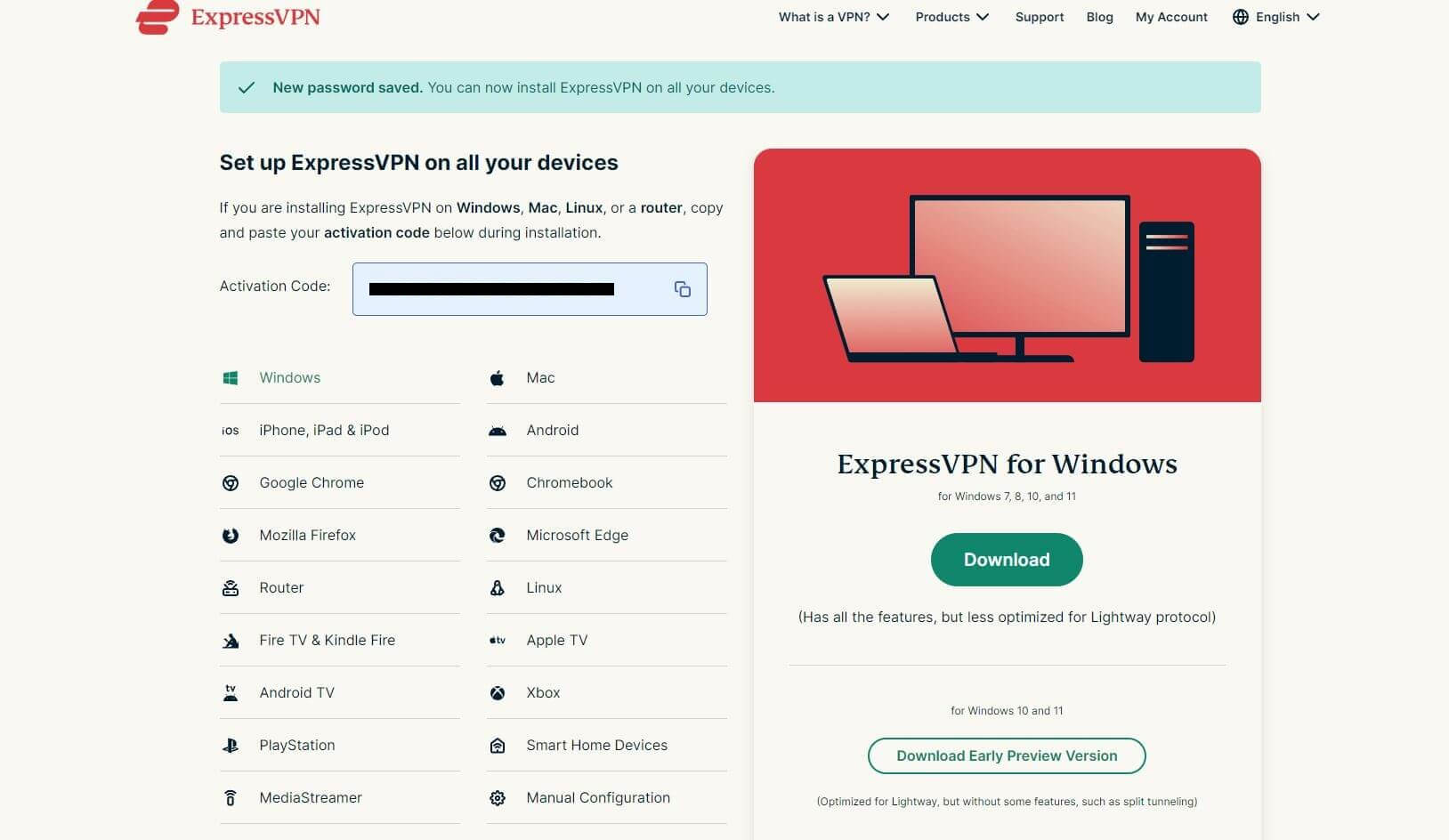
Once the application is downloaded and installed, you’ll need to sign in to the app by using the credentials that ExpressVPN provided after payment. And once, that is done, you’ll get access to the application that looks like this (Windows):
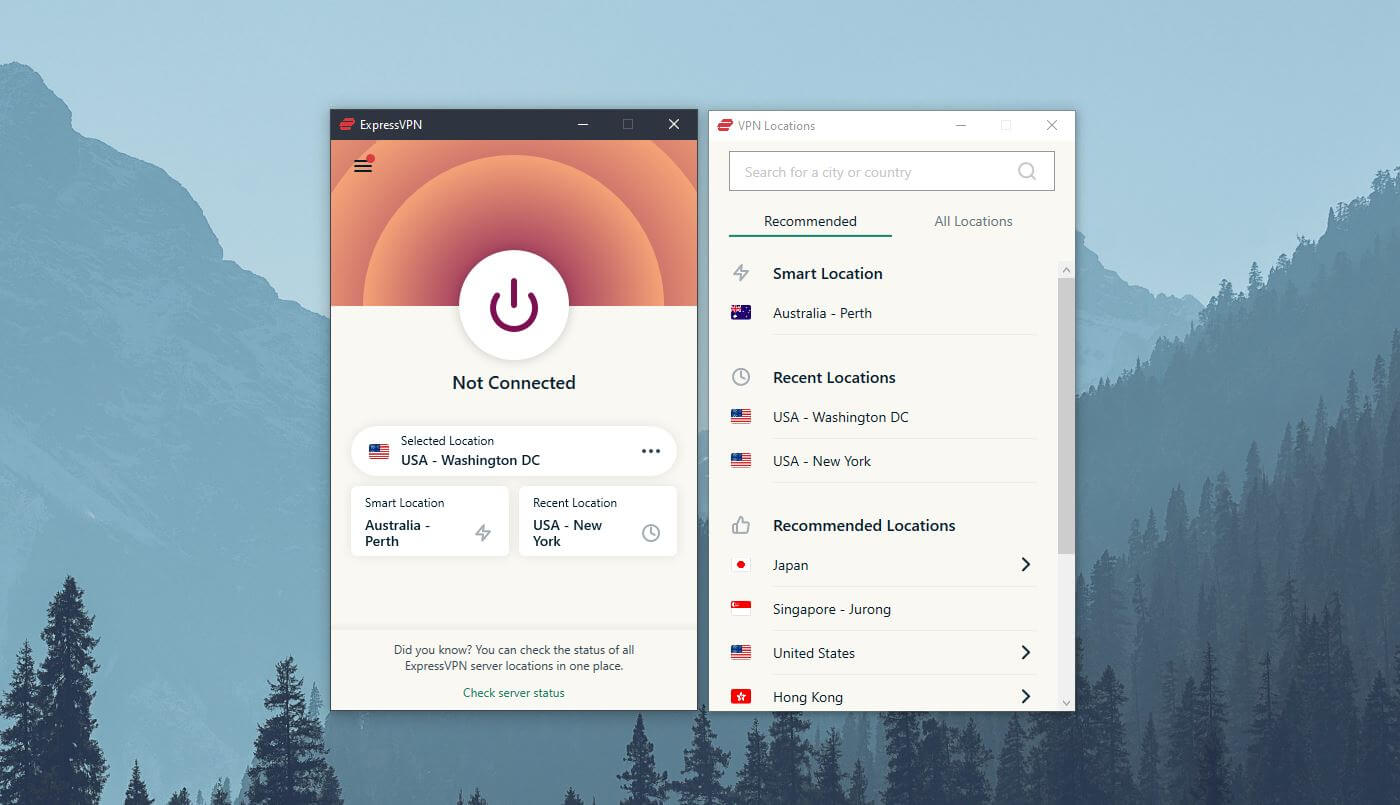
According to our VPN definition, you should know exactly what ExpressVPN can do for you. Therefore, all you need to do is connect to the server of your choice by opening the server list, choosing the server location, and clicking on it twice (Windows).
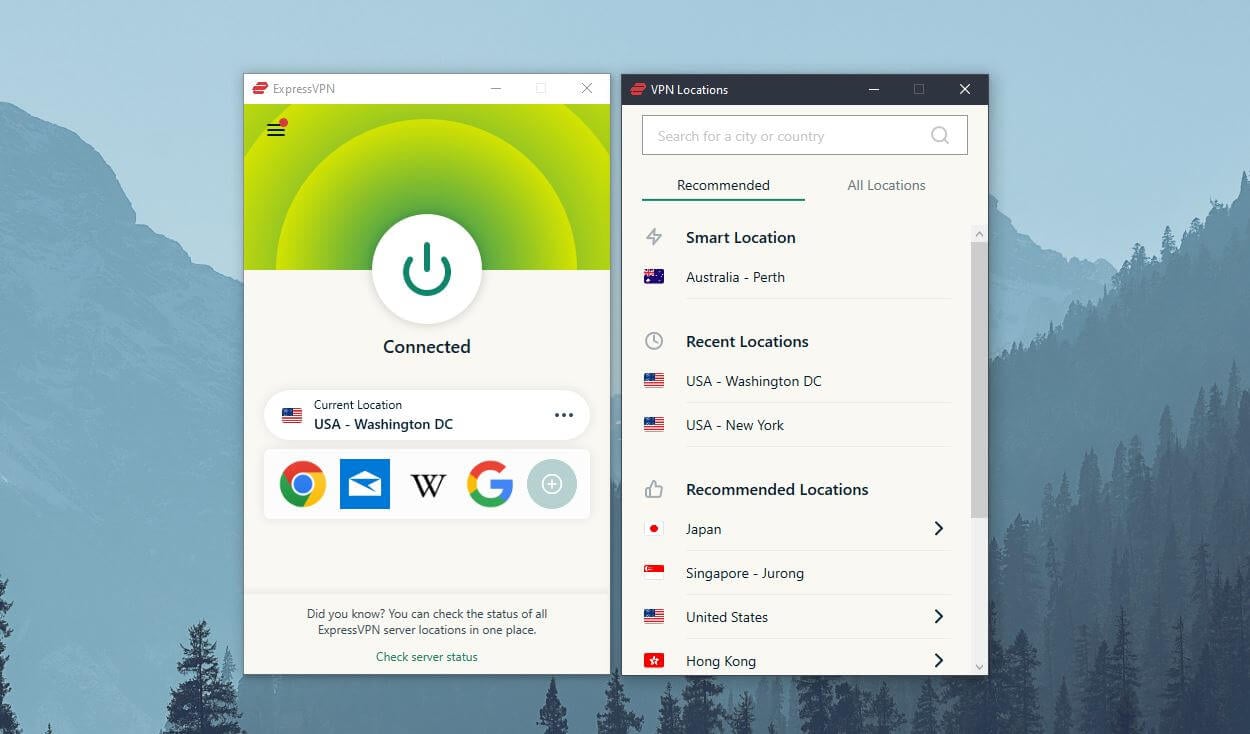
After connecting to the VPN server, the app should look like this, indicating that the connection is successful. And now that you know what VPN means and what it does, you can proceed and enjoy all the great benefits of this service.
By the way, the installation process is pretty much the same for all providers, so if you know how to install ExpressVPN, you’ll know how to install every other VPN. You don’t need to be tech-savvy to use a VPN and that’s the beauty of it!
Which VPN to Choose for the Best Experience
Beware that the VPN definition we talked about applies to the best-case scenario or simply put, the best providers on the market. The benefits we discussed can be achieved with paid (premium) providers and you won’t find them in any free VPN.
With that in mind, we wanted to give you the top 4 choices to consider when getting a VPN. These are the absolute best providers you can get, so you won’t make a mistake by choosing one of them.
1. NordVPN
To learn more about the VPN definition, you might want to check out NordVPN and see what a VPN like this one is capable of. NordVPN is a middle ground between ExpressVPN and CyberGhost, giving you access to more than 5,500 servers in 60 countries globally.
However, NordVPN does some things differently. It offers a huge array of dedicated servers, ranging from obfuscated and P2P to onion over VPN and Double VPN servers for doubling your encryption. This all ties into security where NordVPN excels.
Much like the other two providers, it packs 256-bit AES encryption, a kill switch, split tunneling, and NordLynx, which is its proprietary protocol. Needless to say, NordLynx offers amazing performance and connection stability, making it perfect for P2P activities and streaming.
You’ll like its ability to unblock Netflix and BBC iPlayer, as well. It works with several Netflix catalogs but if you want, you can use it to watch US TV abroad or enjoy intriguing shows and movies on Disney+ and Hotstar.
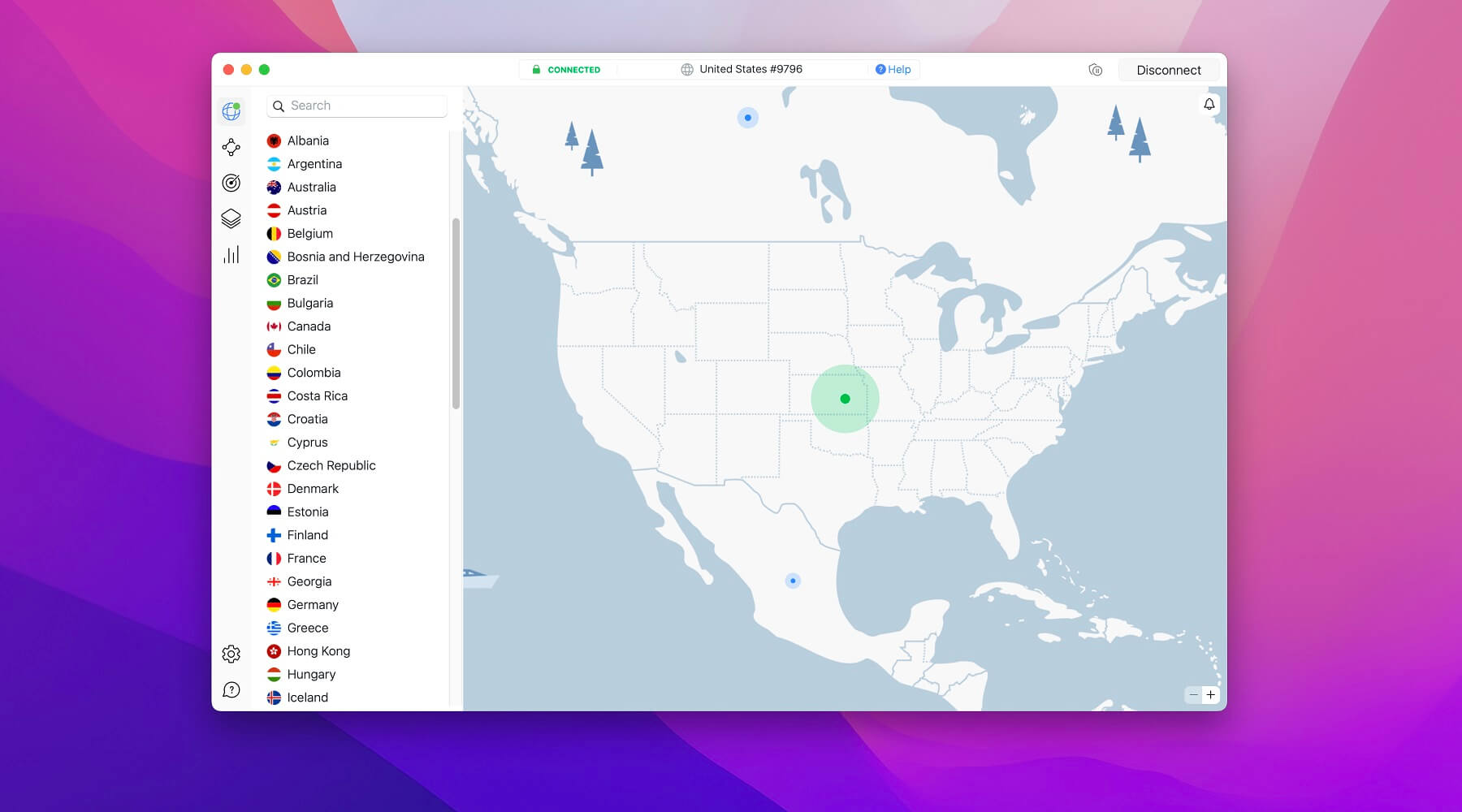
Being based in Panama, NordVPN’s backdrop is surprisingly privacy-friendly. NordVPN isn’t obligated to store any logs and its no-logging policy gives us a broader picture that confirms this. Plus, it has a security audit from PwC, strengthening its no-logs claims further.
A premium VPN definition is all about being the best in all departments. As such, NordVPN offers applications for all platforms, even the least popular ones, with 6 simultaneous connections on a single subscription.
Its 24/7 live chat support is among the best in the business and is offered in multiple languages too. Finally, NordVPN works in China and comes with reasonably priced long-term plans backed up by a 30-day money-back guarantee.
What are you waiting for? You know what a VPN is now, so smash the button below and get the cheapest deal on NordVPN for the biggest savings! To learn more about the provider, you can also read our full test and review of NordVPN here.
Pros
- 5,500 servers across 60 countries
- Double VPN for doubling your encryption
- NordLynx VPN protocol
- Certified no-logging policy
- Obfuscated servers for use in China
- 6 simultaneous connections
- Cheap long-term plans
Cons
- Occasional connection issues
- Expensive short-term plans
2. ExpressVPN
In my experience, the true VPN definition can easily be applied to ExpressVPN. It offers all the aforementioned benefits, starting with 3,000 servers in 94 countries around the globe. This large server fleet guarantees lots of possibilities, one of which is the ability to get extremely fast speeds.
Indeed, ExpressVPN is the fastest VPN, making it great for bandwidth-hungry activities and avoiding ISP throttling. Moreover, ExpressVPN is the most secure choice on the market. With 256-bit encryption, a reliable kill switch, and Lightway, a proprietary protocol, you’ll be hard-pressed to find a more impressive provider.
Security is a top priority here, thus, ExpressVPN is focused on storing pretty much no logs about its users. With no IP addresses or browsing history stored on its servers, this provider managed to get an external security audit from PwC several times.
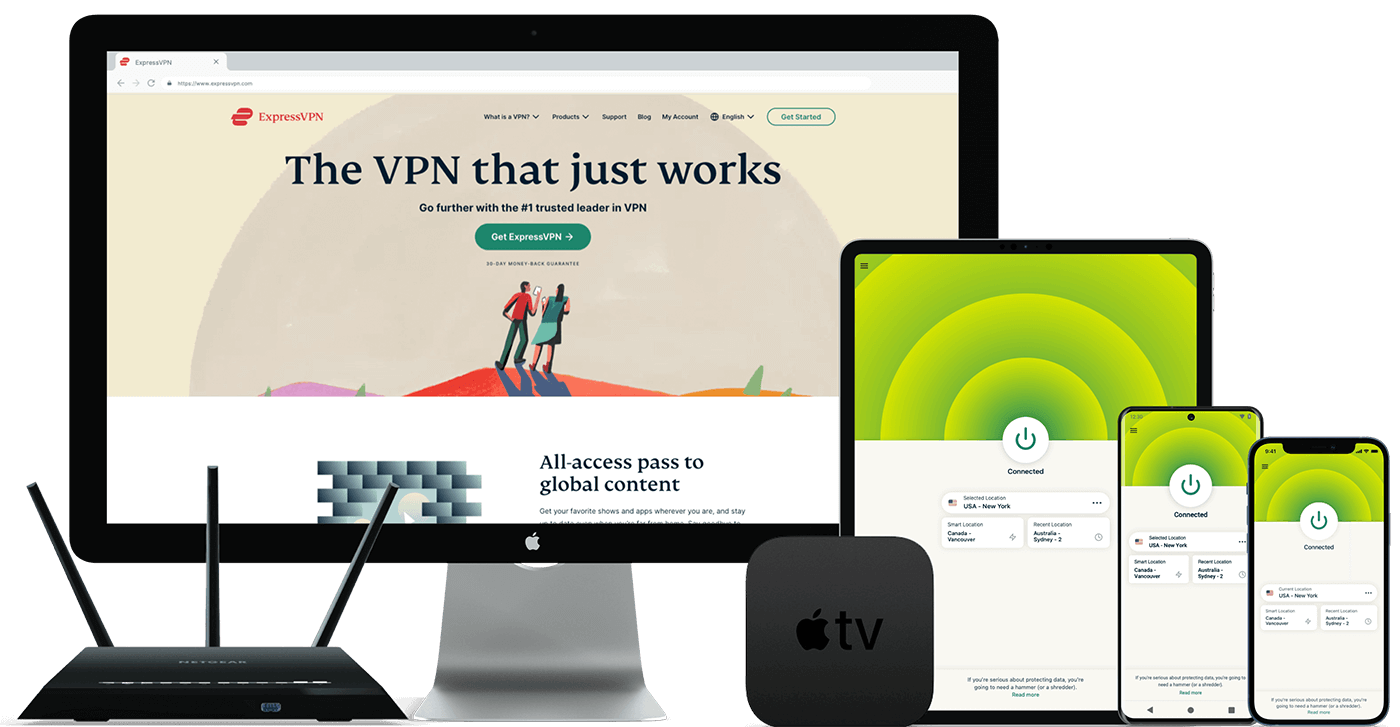
Now, ExpressVPN is capable when it comes to streaming and torrenting as well. Every server is P2P-friendly and many of them work with Netflix US, Japan, and Canada. Apart from that, you can use it to unblock BBC iPlayer or Disney+ and stream in HD without buffering thanks to its amazing performance.
Unlike many other providers, ExpressVPN works in China as well, which is a huge plus. It offers applications for Windows, iOS, macOS (we compared all the best VPNs for Mac here), Linux, and Android but also devices like routers, Smart TVs, and Firestick TV.
One subscription gives you 5 simultaneous connections which are backed up by 24/7 live chat support. All of this makes ExpressVPN one of the best VPNs on the market, with no particular downsides – except for pricing.
However, if you use the button below, you can get a 49% discount and 3 months free for the 1-year plan, plus a 30-day money-back guarantee. This is the cheapest possible deal for this VPN, drastically reducing its price and making it much more affordable.
Pros
- The fastest speeds
- 3,000+ servers in 94 countries
- Rock-solid security
- Audited no-logs policy
- Works with Netflix US, Japan, Canada
- Native apps for all major platforms
- Works in China
Cons
- Not the cheapest prices
- No Dedicated Servers for P2P or Streaming
3. CyberGhost
What is a VPN can be explained easily by opting for CyberGhost. The VPN meaning of CyberGhost is all about affordability and great features for the money. This provider offers a humongous server fleet of 9,100+ servers in 91 countries, which isn’t going to leave you indifferent.
While not faster than ExpressVPN, CyberGhost offers dedicated P2P, streaming, and gaming servers. I like P2P servers a lot for torrenting but streaming servers work like a charm. With them, you can unblock a few Netflix catalogs, enjoy foreign TV channels, and watch BBC iPlayer, Hulu, or Hotstar.
CyberGhost packs all-important security features in an easy-to-use app. Thus, you get bank-grade encryption, IP/DNS leak protection, WireGuard support, and a great ad-blocker. We also like its Romanian jurisdiction, which is a perfect groundwork for non-invasive logging practices.
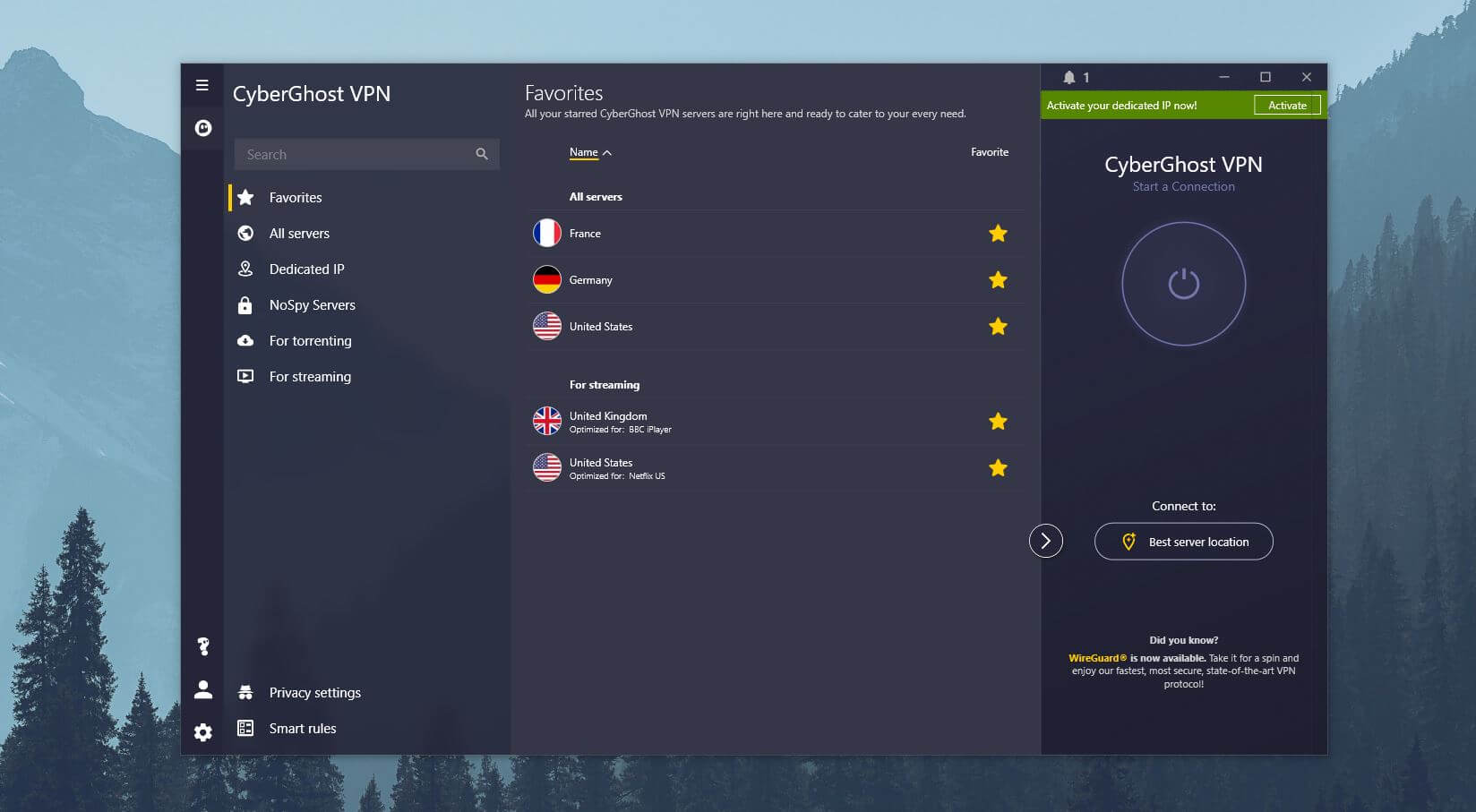
This means that CyberGhost doesn’t store any compromising logs of its users. To that, we should add transparency reports published every 3 months, where CyberGhost outlines every bit of information it refused or didn’t have to give to the authorities.
Despite being so affordable, CyberGhost’s integrity was never put to the test. It’s a safe VPN, offering easy-to-install apps for all major and less popular platforms. Although it doesn’t work in China, it offers 7 simultaneous connections on one subscription, which is better than ExpressVPN.
Perhaps the best thing about CyberGhost is its pricing. It’s the best affordable Virtual Private Network, especially if you go for its long-term plans. In this case, it’ll also give you an unconditional 45-day money-back guarantee, so you can test it out for more than a month.
If you’re looking for a cheap VPN that won’t suck a lot of money out of your account, CyberGhost is surely an amazing choice. Just be sure to use the button below to check its latest prices and claim the cheapest possible deal on this VPN.
Pros
- Dedicated P2P, gaming, and streaming servers
- Over 9,100 servers in 91 countries
- 7 simultaneous connections
- Affordable prices
- Works with Netflix and BBC iPlayer
- WireGuard support
Cons
- Doesn’t work in China
- Not the cheapest 1-month plan
4. Surfshark
Surfshark is a formidable choice for this list. We love this VPN because of its simplicity and customizable apps that can go from dark to light and vice versa in a few seconds. Furthermore, this VPN does almost everything right, yet, it doesn’t charge you a fortune.
Its 2-year plan comes at under $3 a month and you get a 30-day refund policy for all plans. Yet, the provider packs 3,200 fast-speed servers in 95 countries, along with excellent streaming and torrenting capabilities that its users value incredibly.
We should also point out that Surfshark is decent for gaming, as it supports gaming consoles like PlayStation and Xbox. Surfshark comes with MultiHop servers for added encryption and you can utilize its kill switch and split tunneling if you want to personalize the experience.
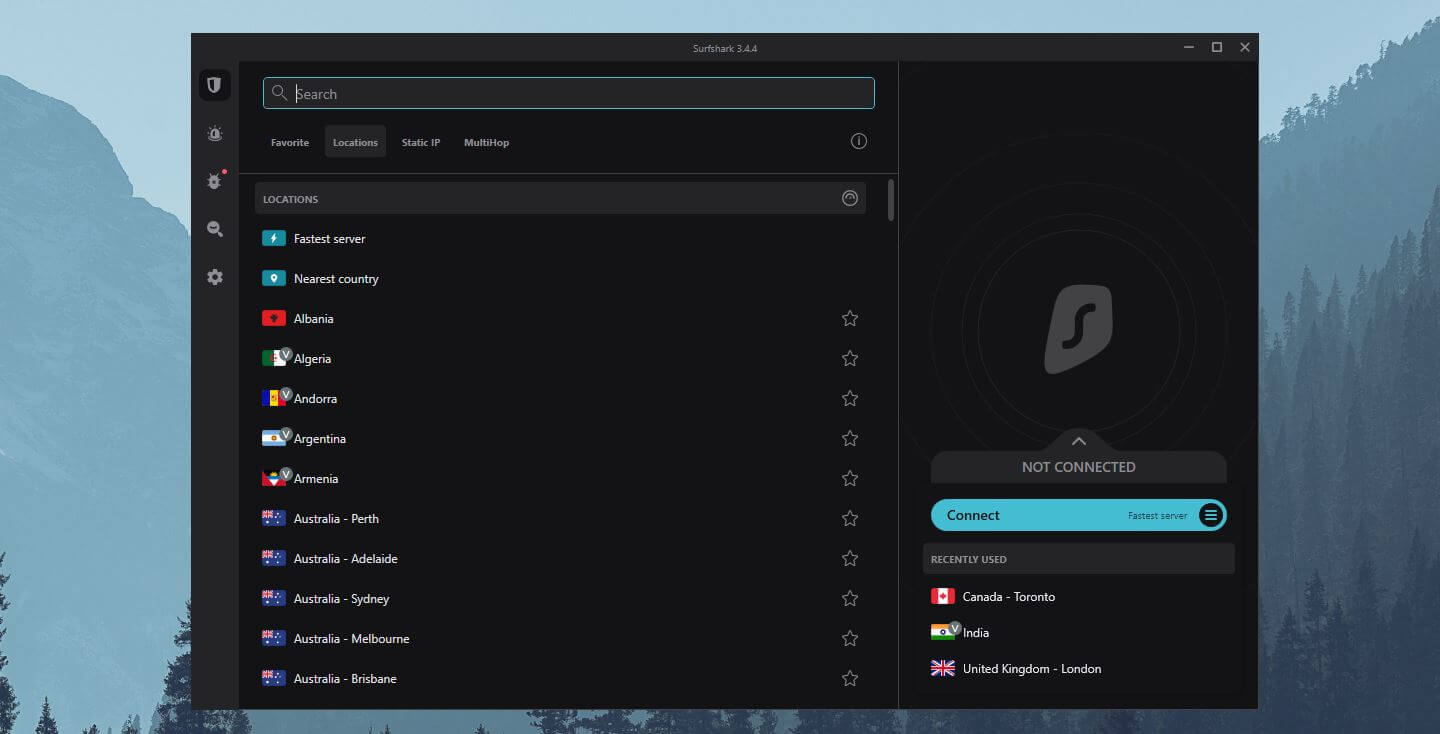
We like its NoBorders mode which allows Surfshark to work in China. And if you want shorter connection times along with 10 Gbps speeds, you can use WireGuard as your main protocol and enjoy 4K streaming, fast torrenting, and low-ping gaming.
Surfshark’s kill switch has occasional issues and the VPN isn’t the fastest. However, that’s not a problem if you consider its overall security. I mean, it offers a no-logging policy audited by Cure53 and Deloitte in 2025, thus, you can expect it to store no personally identifiable data.
Another perk of Surfshark is that it offers apps for all platforms and unlimited connections. If you’re not sure what is a VPN and how it works, the provider also supports tremendous customer support via live chat. It’s available 24/7, and there’s a Blog section where you can find helpful articles and reports.
Overall, this provider surely won’t disappoint you and you can read our in-depth review of Surfshark on our site. Make sure you check it out before purchasing it!
Pros
- Cheap prices
- MultiHop servers
- Static IP addresses
- Audits from Cure53 and Deloitte
- Unlimited connections
Cons
- The monthly plan could be more affordable
- Its kill switch isn’t the best
- It’s slower than CyberGhost (an equally-priced VPN)
Summary
To summarize everything I said about the VPN meaning and definition, let’s digress. A VPN is probably the greatest tool at your disposal for maximizing your level of online privacy and security. What does a VPN mean and what does it do?
Well, the answer to that question is rather simple now. It’s a Virtual Private Network that encrypts your connection and hides your online activities from the prying eyes of your ISP and hackers. That way, it successfully keeps your privacy intact.
To experience all the greatest benefits of this service, we strongly recommend checking out one of the 4 providers we presented. And if you don’t want to lose any money, you can test them out risk-free for 30 or 45 days and get your money back effortlessly. That’s actually the best way to use top-level VPNs for free.
That way, you’ll learn everything about the VPN meaning and what it is in general.
FAQ
Despite my best efforts to explain what a VPN is and what a VPN does, I still have some questions left unanswered. Let’s discuss them now:
? Should I use a VPN at all?
The question of whether or not using a VPN is worth it should be answered by you, as a potential user. For me, using a VPN is mandatory to keep your online activities and your privacy away from potential snoopers.
At the price of merely a few dollars a month, paying for this subscription is definitely worth it. The benefits of a VPN are everywhere, and with this tool, you’ll be able to enjoy not only security but also access to restricted sites, safe torrenting, and saving money on online purchases.
Using a VPN has its cons, however, but we’re talking about very minor ones. For example, a Virtual Private Network can slightly reduce your internet speed given the distance between you and the VPN server.
Great VPNs like ExpressVPN and CyberGhost minimize or eliminate this performance reduction in most cases. Moreover, some websites like Netflix and Prime Video can detect VPN usage and as a result, block your access.
This is typical for low-quality (free) providers that don’t have enough “firepower” to deal with these platforms’ anti-VPN measures. As said, you can completely eliminate all of these issues by choosing the best possible providers we presented above.
So, in the end, we think that you should use a VPN and not worry about downsides as long as you make the right choice.
?️ Is using a VPN safe?
Using a VPN can be both very safe and extremely unsafe, which depends on the provider you’ve chosen. To make sure you fall into the first category, premium providers like ExpressVPN, CyberGhost, NordVPN, and Surfshark should be your first choices.
In that case, you will see what a VPN is capable of and realize that it is indeed safe. With rock-solid security and a no-logs policy, any of the 3 providers we presented are going to give you the highest level of online privacy.
We suggest avoiding providers like Hola VPN or Betternet, though. They’ll give you a real VPN definition of unsafety given their intrusive logging practices and lack of security features.
? What is the meaning of VPN?
VPN stands for Virtual Private Network. The meaning stems from the fact that VPN providers let you connect privately to a remote network that establishes a virtual tunnel through which your internet traffic travels and is protected by encryption.
? Proxy vs VPN – which one is better?
If you know what a VPN is and what it does, you most likely know the answer to this question. A proxy service doesn’t use any VPN servers and instead, relies on changing your IP address to let you access restricted sites.
This service doesn’t use a virtual tunnel to protect your traffic and doesn’t have bank-grade encryption like a VPN. As such, while using a proxy, your ISP can still see that you’re using it, and due to the lack of security features, your privacy doesn’t improve.
Comparing a proxy to our VPN definition and meaning, you can see why a VPN is a much better choice. Proxies are, in most cases, free, and there’s no such thing as free lunch.
So, next time you decide on a free VPN or proxy, think about the fact that you gain nothing privacy and security-wise.